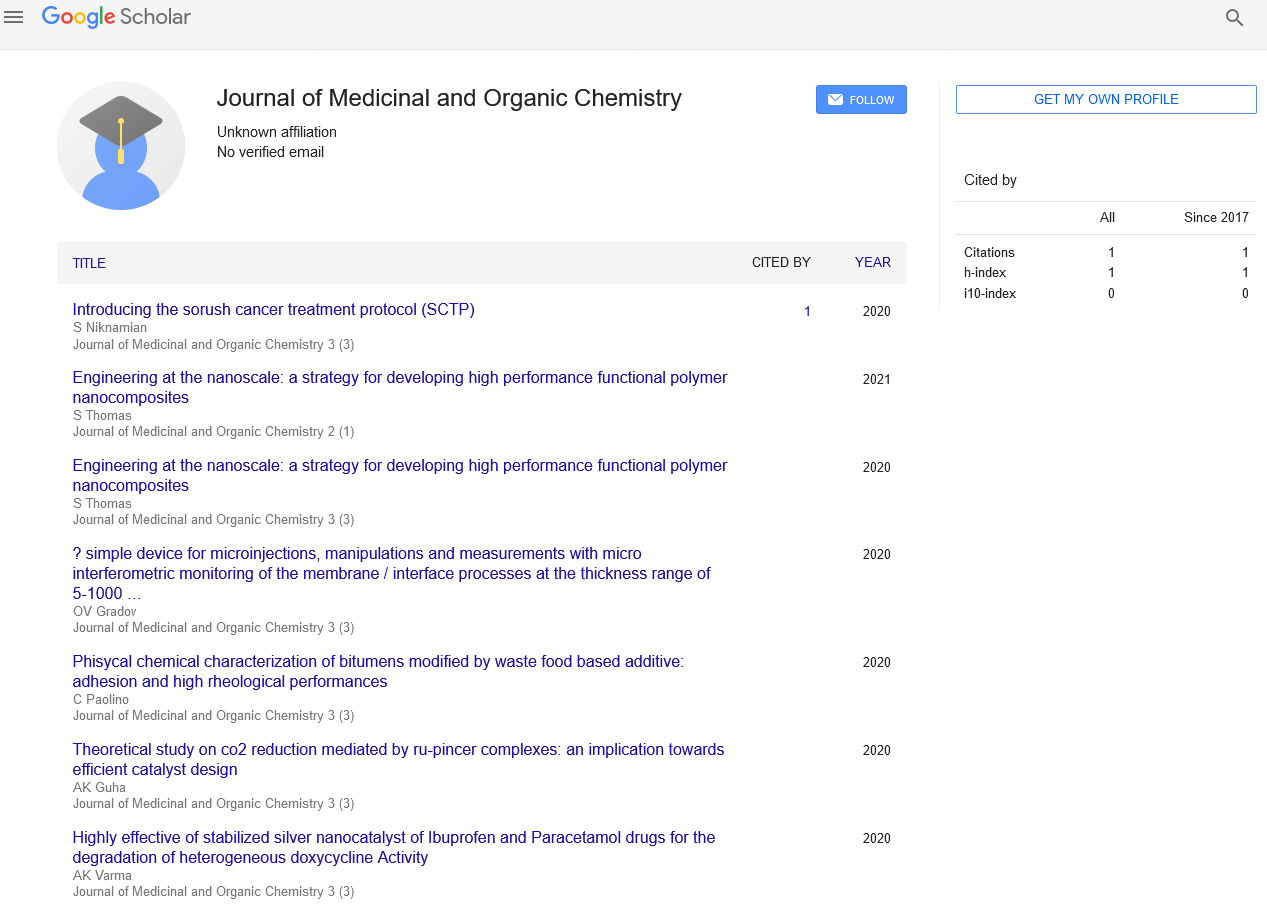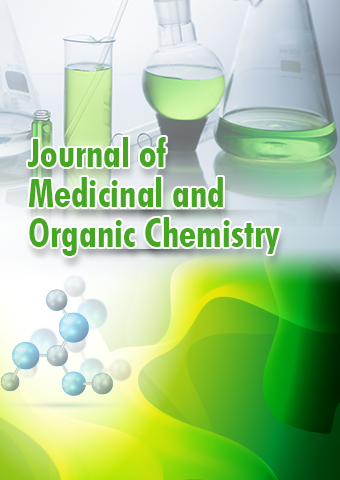Perspective - Journal of Medicinal and Organic Chemistry (2024) Volume 7, Issue 6
The Role of Pharmaceutical Chemistry in Medicine
- Corresponding Author:
- Geetanjali Datta
Department of Chemistry,
University of Rowvert,
Lynchburg,
United States
E-mail: Geetanjali.Da@c.org
Received: 03-Jul-2024, Manuscript No. JMOC-24-140623; Editor assigned: 08-Jul-2024, PreQC No. JMOC-24-140623 (PQ); Reviewed: 22-Jul-2024, QC No. JMOC-24-140623; Revised: 02- Dec-2024, Manuscript No. JMOC-24-140623 (R); Published: 30-Dec-2024, DOI: 10.37532/jmoc.2024.7(6).269-270
Introduction
Pharmaceutical chemistry is a pivotal field that bridges the gap between chemistry and medicine, playing a crucial role in the discovery, development and manufacture of life-saving drugs. This interdisciplinary science encompasses various branches of chemistry, biology, pharmacology and even computational sciences, aiming to design and synthesize new pharmaceutical compounds that can treat, cure or prevent diseases.
Description
Foundations of pharmaceutical chemistry
At its core, pharmaceutical chemistry focuses on understanding the chemical compounds that can alter biological processes, particularly those involved in disease progression and health maintenance. This branch of chemistry delves into the molecular mechanisms of drug action, the Structure-Activity Relationships (SAR) and the optimization of pharmacokinetic properties to ensure efficacy and safety in clinical use.
Drug discovery and development
T he journey of a drug from initial concept to market availability is a complex and lengthy process that involves multiple stages of research and development. Pharmaceutical chemists are involved right from the beginning, where they collaborate with medicinal chemists, biologists and pharmacologists to identify potential drug targets and design molecules that can interact selectively with these targets. Once identified, lead compounds undergo iterative modifications through medicinal chemistry-a branch of pharmaceutical chemistry that focuses on optimizing drug potency, selectivity and pharmacokinetic properties. Structure-Activity Relationship (SAR) studies guide these modifications, helping chemists understand how changes in molecular structure affect drug efficacy and safety.
Medicinal chemistry: Designing effective molecules
Medicinal chemistry, a subset of pharmaceutical chemistry, focuses on the design and synthesis of biologically active compounds. Using principles of organic chemistry, medicinal chemists modify molecular structures to enhance potency, improve pharmacokinetic properties such as absorption and metabolism and reduce toxicity. Computational tools and techniques like molecular modeling and QSAR (Quantitative Structure-Activity Relationship) play a crucial role in predicting and optimizing drug candidates before they enter preclinical testing.
Pharmacology: Understanding drug action
Pharmacology, closely related to pharmaceutical chemistry, explores how drugs interact with biological systems. It examines how drugs are Absorbed, Distributed, Metabolized and Excreted (ADME) within the body, as well as their mechanisms of action at the molecular and cellular levels. This knowledge is essential for pharmaceutical chemists to fine-tune drug properties for optimal therapeutic outcomes.
Analytical chemistry: Quality control
Ensuring the safety, efficacy and quality of pharmaceutical products requires rigorous analytical testing. Analytical chemistry techniques such as spectroscopy, chromatography and mass spectrometry are used to characterize drug compounds, assess purity levels, detect impurities and monitor stability throughout the manufacturing process and shelf life. Quality control measures are essential throughout the drug development process and during commercial manufacturing. Regulatory agencies, such as the Food and Drug Administration (FDA) in the United States and the European Medicines Agency (EMA), enforce stringent standards to protect public health and ensure that pharmaceutical products meet established safety and efficacy criteria.
Regulatory requirements and pharmaceutical chemistry
The pharmaceutical industry is highly regulated to ensure that drugs meet stringent safety and efficacy standards before they reach patients. Pharmaceutical chemists work closely with regulatory affairs specialists to compile comprehensive data on drug development, conduct preclinical and clinical trials according to regulatory guidelines and submit applications for drug approval to health authorities such as the FDA (Food and Drug Administration) in the United States or the EMA (European Medicines Agency) in Europe.
Emerging trends and technologies
Recent advancements in pharmaceutical chemistry include the rise of biopharmaceuticals, such as monoclonal antibodies and therapeutic proteins, which offer targeted therapies for complex diseases like cancer and autoimmune disorders.
Nanotechnology is also revolutionizing drug delivery systems, enabling more precise targeting of drugs to specific tissues or cells while minimizing side effects.
Challenges and future directions
Despite significant progress, pharmaceutical chemistry faces several challenges, including the rise of drug resistance, the need for more personalized medicine approaches and the high cost and time investment in drug development. Future directions in the field may involve harnessing artificial intelligence and machine learning to accelerate drug discovery, exploring new modalities like gene therapies and addressing global health disparities through access to affordable medicines.
Ethical considerations are paramount in pharmaceutical chemistry, particularly concerning patient safety, informed consent and equitable access to medications. Researchers and industry professionals must navigate complex regulatory landscapes and uphold ethical standards to ensure the responsible development and distribution of pharmaceutical products.
Conclusion
Pharmaceutical chemistry plays a vital role in advancing healthcare by translating chemical knowledge into effective therapies that improve and save lives. By integrating principles from chemistry, biology and pharmacology, pharmaceutical chemists continue to drive innovation in drug discovery, development and manufacturing, paving the way for a healthier future.

